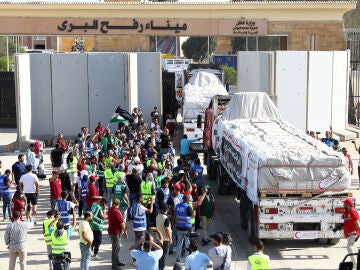
The heads of State and Government of the Twenty-Seven agreed this Thursday to request “humanitarian corridors and pauses for humanitarian needs” from Israel and Hamas, to guarantee the supply of aid to civilians in the Gaza Strip, and to support the holding of a peace conference “soon”, as claimed by the acting president of the Spanish Government, Pedro Sánchez.
After a six-hour discussion on the crisis in the Middle East after the unprecedented attack by Hamas on October 7, the leaders of the Twenty-seven ask “continued, rapid, safe and unimpeded humanitarian access and help to reach those in need by all means necessary, including humanitarian corridors and breaks for humanitarian needs”.
This call has ended up being the consensus formula among the Twenty-Seven, who have days of diplomatic negotiations to find language to call for a truce in Gaza in the face of the reluctance of member states such as Germany or Austria, which asked to make clear Israel’s right to combat the terrorist group and They rejected the request for a ceasefire, as Ireland or Spain defendedin line with the Secretary General of the United Nations, António Guterres.
In any case, the European bloc places Israel’s respect for International Law as a limit to its response to Hamas and demands the protection of civilians “at all times”, stressing that the terrorist organization must unconditionally release the 200 hostages taken. during his attack on October 7. “Unity is our strength. Agreement on the conclusions of the European Council on the situation in the Middle East”, indicated the President of the Council, Charles Michelwho arrived at the summit ensuring that unity was the best argument against criticism of the EU for double standards.
Likewise, the European position places emphasis on revive the political process for the two-state solution and welcomes diplomatic initiatives in this regard, noting its support for organizing an “international peace conference soon.”
A pax conference “soon”
Diplomatic sources explain to Europa Press that Spain has maintained a “hard” position until the last moment to include the term ‘ceasefire’ in the conclusions of the summit, something that was a red line for several European partners such as Germany or the Netherlands due to the implications it has on the crisis and Israel’s ability to respond to Hamas. Spain also requested the involvement of Europe in a peace conference that would provide a political perspective to the crisis in the Middle East and advance the recognition of the State of Palestine.
Sánchez has reached the summit with the proposal of a peace conference “in six months” to promote the recognition of Palestine, since sources from the Spanish delegation see that it is a concrete way for the peace process to not be a shell and they defend that it is in the interest of Israel. The Spanish president already brought this initiative to the summit organized by Egypt in Cairo last Saturday to discuss the crisis between the countries of the region, although without the United States or Israel, and the Foreign Minister, José Manuel Albares, put it on the table of their European counterparts this Monday in Luxembourg.
Sources from the Spanish delegation assess how a success that the entire EU endorses Sánchez’s proposal and understands that it is time to be brave and promote a solution to the conflict that has been stalled for several decades due to violence and lack of commitment in the Middle East despite the resolutions and plans of United Nations.
Furthermore, they point out that this agreement of the European Union, which has a united position, puts pressure on Israel to allow humanitarian access and is useful for working within the United Nations framework. In this sense, they consider that the fact that the EU accepts humanitarian pauses establishes a negotiating dynamic in the Security Council that can be useful.
Spain is aware that At this time it is not possible to hold the peace conference because the conflict is at a boiling point. and they even admit that it may not be possible within six months, the date set by Sánchez, but they celebrate the establishment of a concrete reference to holding a summit that Spain would not necessarily host. They affirm that the president has managed to convince the rest of the European partners about the need for the EU to make its way into the international community with a conference that advances the two-state solution.
The sources consulted do not clarify whether Sánchez’s trip to Israel may take place soon, but they indicate that they will continue to hold talks at all levels so that the EU and Spain play their corresponding role in resolving this crisis.
Source: Lasexta
Ricardo is a renowned author and journalist, known for his exceptional writing on top-news stories. He currently works as a writer at the 247 News Agency, where he is known for his ability to deliver breaking news and insightful analysis on the most pressing issues of the day.












